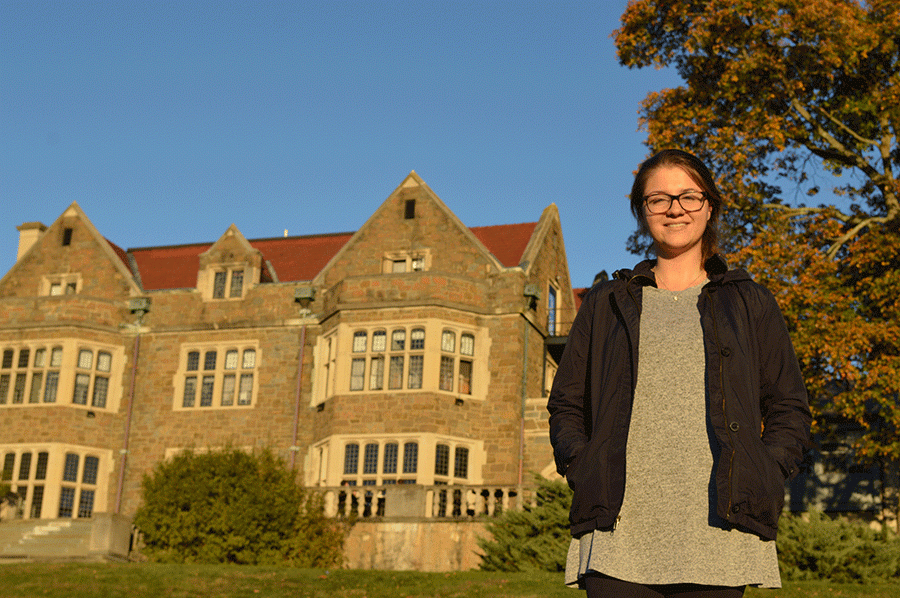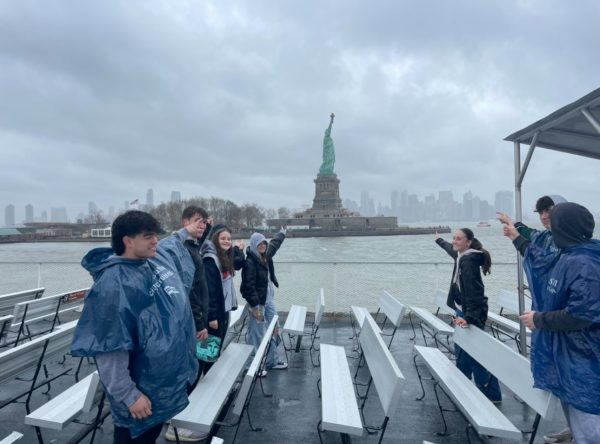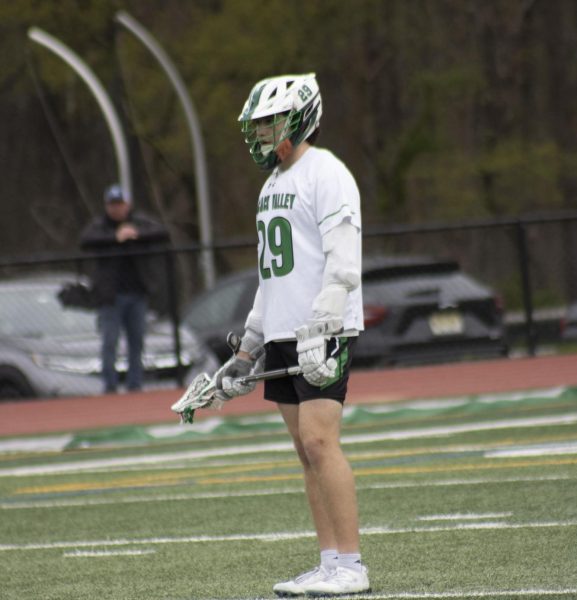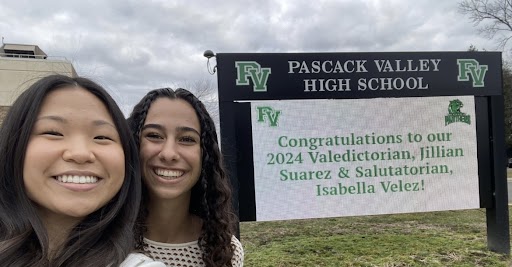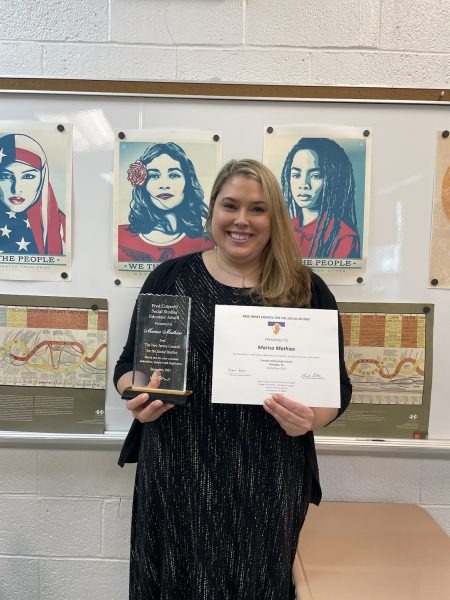Pushing back against censorship
The New Voices movement inspires New Jersey bill to protect freedom of expression among student journalists
Adelina Colaku, a student at Bard College, reflects on her previous experience with censorship at Northern Highlands High School.
In 2014, Northern Highlands student Adelina Colaku tried to publish an article in her school newspaper, The Highland Fling, but was prevented by the school’s administration. The principal, Joseph Occhino, censored the article, a piece discussing sensitive issues within the school’s staff. Colaku, who was the Editor in Chief of the paper at the time, was quick to fight back.
“I told them that if they didn’t publish my article in full, I would have no hesitation taking it to court,” Colaku said.
As a student, freedom of speech is limited. High school students do not have the ability to say or write anything they want. Vulgar speech, for example, is prohibited, along with anything that may cause a disruption. But how does this apply to a school’s newspaper? Does it have the right to publish the whole, uncensored truth?
This is the premise of the nationwide New Voices movement, which aims to defend these specific rights for student journalists. Its goal, according to its mission statement, is “to give young people the legally protected right to gather information and share ideas about issues of public concern.” The first state to pass such a law, protecting both high school and college journalists, was North Dakota in April of 2015. Since then, Oregon, California, Illinois, and Maryland have passed similar bills. Additionally, there are six states that have passed bills protecting high school students but not college students. Another eighteen states have bills pending, each offering various degrees of protection.
New Jersey is one of those 18. The bill was introduced in December of 2015 by former assemblywoman Donna Simon (R- Hunterdon). After Simon left office, the bill was reintroduced on June 30 by Assemblywoman Gail Phoebus (R-Sussex) and Assemblyman Troy Singleton (D-Burlington). An identical companion bill was proposed on August 1 by New Jersey state senators Diane Allen (R-Burlington), Nia Gill (D-Montclair), and Jennifer Beck (R-Monmouth).
The student chapter of the Garden State Scholastic Press Association (GSSPA) has worked to provide a support system for student journalists dealing with administrative censorship in New Jersey, and is currently working to raise awareness for this bill.
We strive to create a professional paper, so we should be treated as professionals.
— Kaitlyn Boyle, Editor in Chief of Cherry Hill East's 'Eastside' and VP of the student chapter of the GSSPA
Kaitlyn Boyle, Vice President of the student chapter of the GSSPA, has had her own experiences regarding restriction in high school. Eastside, her school newspaper at Cherry Hill High School East, had poor relations with its administration, which is one of the reasons why she believes this is such a pressing issue.
“The administration doesn’t always take our publications as seriously as we would like,” Boyle said. “But we strive to create a professional paper, so we should be treated as professionals.”
The proposed bill protects public school districts and public universities and asserts that students have “the right to exercise freedom of speech and of the press.” This protects all school sponsored media against administrative censorship and prohibits any school rules restraining their freedom. Schools would also be required to adopt a written policy regarding the freedom of expression given to school newspapers that is in compliance with the bill.
Staff advisors would be protected from retaliation under the bill when supporting the First Amendment rights of their students.
Under the proposed bill, students would be treated as equals to professional journalists. They would not be able to publish anything that is “libelous or slanderous,” an “unwarranted invasion of privacy,” against state law, or that would put the student or school in a dangerous situation. There is also a statement that says students are not allowed to publish material that would cause the, “disruption of the orderly operation of the school.” This references the infamous 1988 Supreme Court decision of Hazelwood School District v. Kuhlmeier, in which the Court ruled in favor of the school’s right to prior review in particular cases. Although students are given more freedom in the newly proposed bill, there are still these regulations in place.
People aren’t always aware of student press issues until brought to public attention, but it happens often.
There could have been a lot more productive debate about the topic had [the original article] not been outright censored.
— Adelina Colaku, former Editor in Chief of 'The Highland Fling'
In the Northern Highlands case, there was a prior review policy already in place. Occhino’s disapproval was originally due to the sensitive issues addressed in the article, but he later questioned its use of anonymous sources and accused it of bias. Colaku appealed her case to the Board of Education and the Superintendent, leading to months of legal negotiation. Three months later, the administration allowed the article to run in full.
“That article that I wrote impacted not only the school district, but the whole community,” Colaku said. “There could have been a lot more productive debate about the topic had [the original article] not been outright censored.”
A similar case occurred at Pemberton Township High School in 2013, where a prior review policy had been in place since 2010. The school’s principal Ida Smith censored two articles, one about the departure of the school’s athletic director and one about an increase in student smoking. Following this situation, the students attempted to write an article about censorship itself, which was met with the same administrative disapproval as the previous ones.
Eventually, revised versions were allowed to be published in the paper. However, the newspaper’s advisor, Bill Gurden, was later removed from his position after his students published an approved newspaper issue online without specific authorization from Smith. He was allowed to continue to teach in the district but was no longer allowed to teach any journalism or advanced classes.
Most of the time, when an administrator tries to censor something, it’s an attempt to conceal something.
— Frank LoMonte, Executive Director of the Student Press Law Center
More of these stories exist, both statewide and nationwide. However, many of them get pushed under the radar.
Frank LoMonte, the Executive Director of the Student Press Law Center, or SPLC, shares this sentiment. According to its website, the SPLC is “devoted exclusively to educating high school and college journalists about the rights and responsibilities embodied in the First Amendment.” It aims to support student news outlets in covering issues and preventing administrative censorship.
In LoMonte’s opinion, there is almost never a reason an administrator should stop a story from running.

GSSPA members (from left to right) Kaitlyn Boyle and Ashley Cooper, students from Cherry Hill East High School, with SPLC Executive Director Frank LoMonte advocate for freedom of the student press.
“Libel would be a reason to censor an article,” LoMonte said. “But in those cases you don’t censor, you educate. Most of the time, when an administrator tries to censor something, it’s an attempt to conceal something.”
LoMonte also believes that the censorship can affect a student’s growth as a journalist.
“The message of censorship is that you aren’t allowed to question the government. Journalists have to ask: how can we make things better?” he said.
LoMonte said that it ultimately comes down to students to advocate for their rights. He stresses that they are the ones who have the platforms to advocate. According to him, feedback coming from a student is “more powerful than coming from some person in Washington.”
Boyle stresses that this bill is all about students having a voice.
“Know your rights,” Boyle said. “Know the power of your voice, and you can really make a change in your school.”

